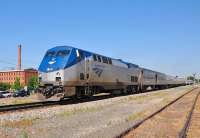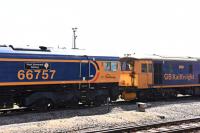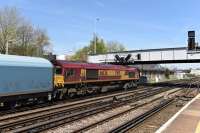This day in history 05 May
Images
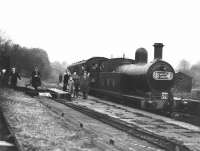
West Vale: L&YR 2-4-2T no 50865 of Southport shed stands at the former West Vale station (closed to passengers 1929) with the SLS/MLS 'Pennine Rail Tour Special' on 5th May 1951. The gentleman in the hat and long coat striding towards the boxes on the platform is the late Mr. J. E. Shaw, long time Accrington Branch Secretary of the Stephenson Locomotive Society. [Correction/resubmission - with thanks to Vic Smith and the Manchester Locomotive Society]
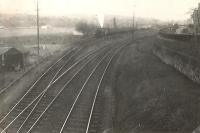
Corsebar Junction: Horwich Mogul 42914 on loop on Potterhill Branch.
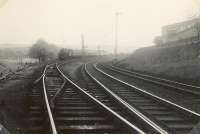
Corsebar Junction: Horwich Mogul 42914 on loop on Potterhill Branch.
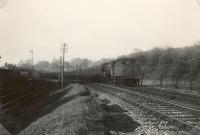
Corsebar Junction: Mogul 42914 entering Potterhill Branch for running round.
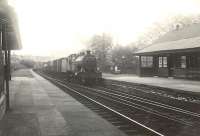
Paisley West: Compound 4-4-0 no 40915 runs through Paisley West on 5 May 1953 with goods for Ardrossan.
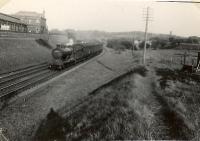
Potterhill Junction: CR 4.4.0 54453 passing site of Potterhill Junction on Greenock train. [RailScot note: sources vary on whether this is Potterhill or Meikleriggs Junction.]
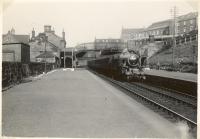
Paisley Canal [1st]: Largs Express at Paisley (Canal). 2.6.4T 42194.
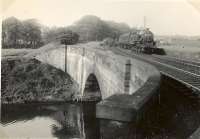
Blackhall Viaduct: Original bridge (1810) carrying Paisley Canal over River Cart, near Hawkhead. Class 2 2.6.4T 42229 on Greenock train.
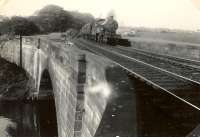
Blackhall Viaduct: Original bridge (1810) carrying Paisley Canal over River Cart, near Hawkhead. Class 2 4.4.0 40572 on Kilmarnock via Dalry train.
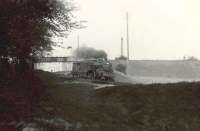
Hawkhead: 'Crab' 2-6-0 42911 westbound with a brake van after passing through Hawkhead station on 5 May 1953. In the background is the bridge carrying the Paisley and Barrhead District Railway. [Ref query 881]
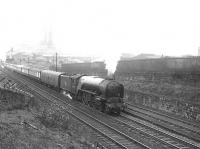
Cowlairs Incline: The up Queen of Scots Pullman climbing Cowlairs Incline on 5 May 1956. Locomotive in charge is A2 Pacific 60535 Hornet's Beauty, with N15 0-6-2T 69188 working hard at the rear.
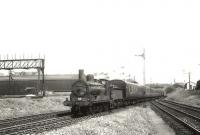
Maxwell Junction: Jumbo 0-6-0 57296 westbound passing through Maxwell Junction on 5 May 1956 with a Dalmarnock to Ibrox football special.
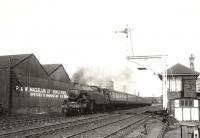
Pollok Junction: Fairburn 2-6-4T 42246 runs through Pollok Junction on 5 May 1956 with a Wemyss Bay express.
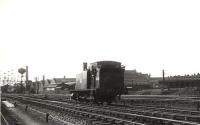
Shields Junction No 1: McIntosh 0-6-0 dock tank 56160 passing Shields No 1 Junction on 5 May 1956. The 'Beetle Crusher' is on its way home to Polmadie shed. See image [[25059]]
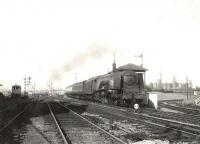
Langside Junction: Stanier Pacific 46227 Duchess of Devonshire heading south through Langside Junction on the afternoon of 5 May 1956. The train is the Saturday 5.30pm Glasgow St Enoch - Carlisle.
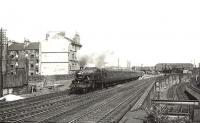
Pollok Junction: Fairburn 2-6-4T 42698 westbound through Pollok Junction on 5 May 1956 with a Gourock train. The dive under for Kinning Park Goods is at the lower level to the right, now known as the Burma Road.
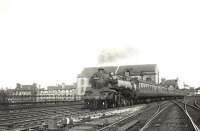
Port Eglinton Junction: BR Standard 2-6-4T 80127 passing Port Eglinton Junction on 5 May 1956 with a Saturday service to Largs. The class 4 tank locomotive had arrived at Corkerhill new from Brighton Works 6 months earlier and would remain there until its eventual withdrawal by BR in the summer of 1964.
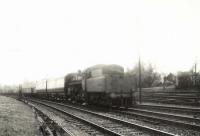
Bellahouston No 1 Junction: Standard Mogul 77008 on the spur from Maxwell Junction up to Bellahouston No 1 on 5 May 1956. [Ref query 1080]
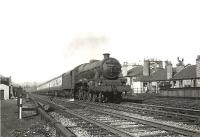
Gorbals Junction: Jubilee 45691 Orion passing through Gorbals Junction on Saturday 5 May 1956 with a Glasgow St Enoch - Stranraer express.
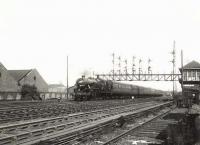
Shields Junction No 1: Fairburn 2-6-4 tank 42176 passing Shields No 1 Junction with a Glasgow - Gourock train on 5 May 1956. Built at Derby in 1948, the locomotive spent its life as a resident of Greenock Ladyburn shed.
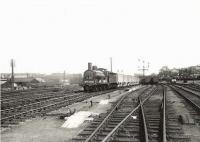
Shields Junction No 1: 'Jumbo' 0-6-0 57230 climbs up from Maxwell Junction to Shields no 1 with a westbound freight on 5 May 1956.
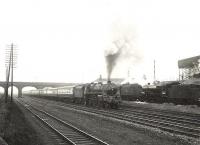
Balornock Shed: BR Standard class 5 4-6-0 no 73120 climbs past Balornock shed with the down Granite City, shortly after leaving Buchanan Street on 5 May 1956. The locomotive had been built at Doncaster works and delivered to Perth shed just four months earlier.
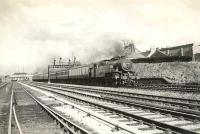
Elderslie: Fairburn tank 42212 with a down Largs semi-fast photographed at Elserslie on 5 May 1959.
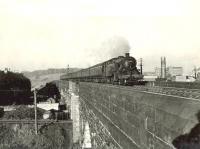
Ferguslie Viaduct: A down Largs train crossing the viaduct at Elderslie on 5 May 1959. The locomotive is Ardrossan shed's Fairburn 2-6-4T 42697. In the foreground, left, is the [[Paisley and Barrhead District Railway]] line.
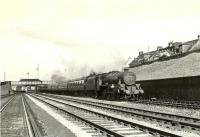
Elderslie: A down Largs express photographed at Elderslie on 5 May 1959 behind Corkerhill Black 5 4-6-0 no 45007. [Ref query 21 August 2018]
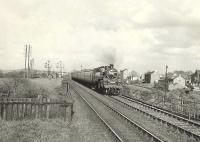
Elderslie Fly Under: BR Standard 2-6-4T no 80009 passing through Elderslie with a train for Ayr in May 1959. The train is about to cross the bridge over the line used by trains turning north to reach [[Cart Junction]] see image [[22985]].
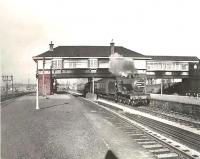
Elderslie: Class 2P 4-4-0 40687 at Elderslie on 5 May 1959 with a Kilmarnock via Beith train.
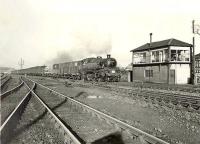
Canal Junction [Elderslie]: Hard working BR Standard 2-6-4T no 80057 brings a lengthy freight through Elderslie No 1 Signal box (Canal Junction) in the late spring of 1959.
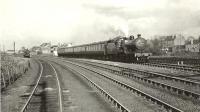
Elderslie No 2 Junction: 40689 diverging at Elderslie No 2 Junction on 5 May 1959 with a train for Kilmarnock via Kilbirnie. Elderslie station stands in the left background. [Ref query 31 March 2018]
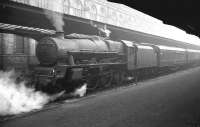
Bradford Forster Square: Holbeck 'Jubilee' no 45608 Gibraltar with a train at Bradford Forster Square in May 1962.
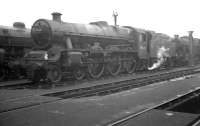
Rose Grove Shed: Jubilee 45580 Burma photographed on Rose Grove shed in May 1962.
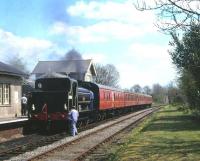
Cranmore: Ex-GNR J52 0-6-0ST no 68846 at Cranmore on the East Somerset Railway on 5 May 1996 see image [[17498]].
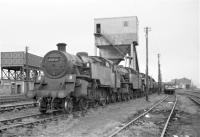
Polmadie Shed: A line of stored locomotives at Polmadie on 5th May 1967, those nearest the camera being 80116, 42274 and 80120. All had been included in the previous weekend's withdrawal of every remaining Scottish Region steam loco, apart from two Fife-based J36s that were retained for possible use on the film set for the BBC's Dr Finlay's Casebook. In the event, this did not happen and neither J36 steamed again before withdrawal the following month.
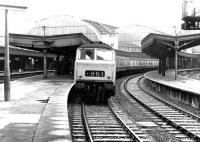
Paddington: An afternoon semi-fast service to Worcester and Hereford prepares to leave Paddington station in May 1969 behind an unidentified 'Hymek' diesel-hydraulic locomotive.

Paddington: Brush Type 4 no D1909 with an arrival from South Wales at Paddington platform 1 on 5 May 1969.

Paddington: Hymeks 7031 (left) and 7002 stand at the buffer stops at Paddington station in May 1969.
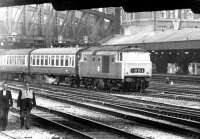
Paddington: A Hymek leaving Paddington with a train for Worcester and Hereford, taken from Royal Oak Metropolitan Line station in May 1969. Part of Paddington's large parcels depot, with its dedicated platform, stands in the background.
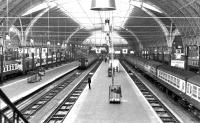
Paddington: View from the footbridge at Paddington in May 1969.

Plates, signs, notices etc: Anyone in 1970 fancying a summer daytrip to North Berwick during the week, or anyone from there wanting to go Christmas shopping in Edinburgh, would have had to have been pretty determined if they chose to travel by rail. No weekday trains at all between breakfast and teatime. Presumably the station was locked up for most of the day. One would think BR were trying to make the branch as uneconomic as possible as a reason for closing it. BR Scottish Region timetable 4 May 1970 to 2 May 1971.
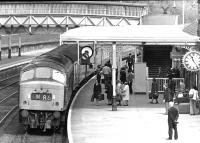
Dumfries: The 09.30 Glasgow Central - London St Pancras 'Thames - Clyde Express' rolls into Dumfries in May 1971, behind the usual 'Peak' locomotive working back to Leeds. Note the time on the station clock. Despite the 'Express' tag, the train had a scheduled end to end journey time of 8 hours 50 minutes in the 1960s and early 1970s.
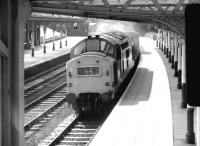
Dumfries: A mixed freight runs north through Dumfries at speed on a bright May morning in 1971 behind an EE Type 3 locomotive. Grab shot taken from the footbridge stairs.

Dumfries: Class 50 no 439 runs through Dumfries with a diverted WCML service in May 1971, having just passed a freight heading north. Note the top of the old 'lighthouse' signal box can just be seen in the background above the first coach.
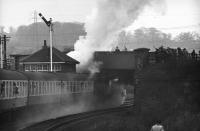
Inverkeithing East Junction: 60009 'Union of South Africa' passes Inverkeithing East Junction signalbox with the Scottish Steam No.1 special, which the A4 hauled from Inverkeithing to Dundee. This marked the return of main line steam on the Scottish Region. 5 May 1973.
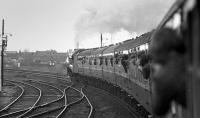
Leuchars: A4 60009 leaves Leuchars with the first Scottish Steam Special, marking the return of steam to the main line on 5 May 1973. The down sidings were removed in February 2022.
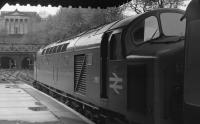
Edinburgh Waverley: EE Type 4 269 at Waverley with the 'Scottish Steam No.1' excursion on 5th May 1973. It will haul this to Inverkeithing to be replaced by A4 60009, for the first main line steam trip since dieselisation.

Shirebrook: A class 56 with a coal train about to pass through the remains of Shirebrook West station on a hazy May morning in 1980. The train is passing the modern diesel locomotive shed (code 41J) opened in 1965 as part of the BR Modernisation Plan to handle the large volumes of coal traffic in this part of the York, Notts, Derby Coalfield.
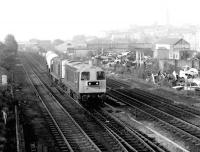
Chesterfield: Having just cleared Chesterfield station in May 1980 a northbound freight, hauled by a pair of class 20s, seems to be moving over to the down slow line to avoid the less than attractive car dump. The town's famous twisted spire can just be seen through the haze in the right background.

Shirebrook: Looking south from Station Road, Shirebrook, on 5 May 1980 as 56004 reverses its train of coal empties through the old station. The 1965 Shirebrook West diesel depot (coded 41J) stands in the left background.
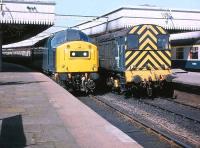
Aberdeen: 40173 and 08855 at the south end of Aberdeen Station on 5 May 1980
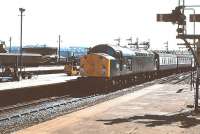
Aberdeen: 40081 arrives out of the sun at Aberdeen on 5 May 1980 with a train from the south.
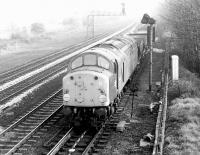
Chesterfield: A Class 40 with a ballast train approaching Chesterfield station from the north on a misty May morning in 1980.
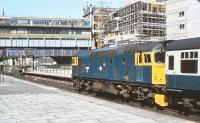
Aberdeen: 27003 with an Inverness train in Aberdeen Station on 5 May 1980.
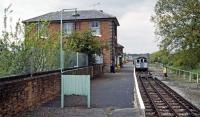
Ongar: This station, photographed on 5th May 1980, is of the '1865 type' Great Eastern architecture used on many rural lines in Essex and Suffolk, and was thus familiar to the eye. However, the visual double-take of the time was the presence of diminutive London Underground tube stock at the platform instead of a more typical first generation DMU. The station was then the Central line terminus at Ongar and the train is the Epping – Ongar rush hour shuttle service (via North Weald and Blake Hall). Always something of an overstretched extension of the London Underground/Great Eastern system, the line to Ongar from Epping was closed in September 1994, but lives on as a heritage railway.
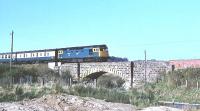
Pitcaple: 27005 eastbound towards Aberdeen near Pitcaple on 5 May 1980.
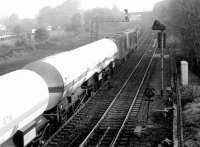
Chesterfield: A down freight, photographed heading north towards Tapton Junction on 5 May 1980 shortly after passing through Chesterfield station behind a pair of EE Type 1s.

Shirebrook: A class 56 locomotive brings coal empties through Shirebrook West station in May 1980.

Birmingham Moor Street: Morning commuters arriving off DMUs from Stratford-Upon-Avon and Leamington Spa at Birmingham Moor Street station in 1981.

Glasgow Queen Street High Level: End of the platform scene at Glasgow Queen Street in May 1981, with 37035 waiting to leave with a train for Oban. Standing on the right is 27001.

Glasgow Queen Street High Level: A Type 2 emerges with a train out of Queen Street Tunnel in the spring of 1981, passing 37035 preparing to depart for Oban.
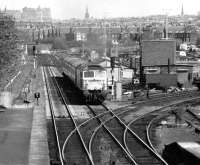
Slateford Junction: The 13.05 Edinburgh - Bristol passing through Slateford in May 1982 behind 47705 Lothian.
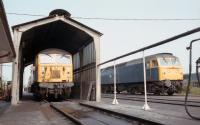
Westbury: Westbury stabling point on 5th May 1984, with class 56 and 47 locomotives present.
See query 2266
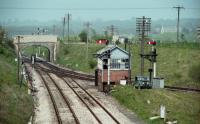
Hawkeridge Junction: Hawkeridge Junction on 5th May 1984, shortly before abolition of the signalbox. With thanks to my local guide Peter Todd.
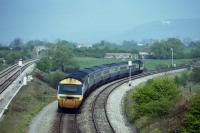
Fairwood Junction: An HST takes the avoiding line at Fairwood Junction, with Westbury White Horse faintly visible through the haze, on 5th May 1984.
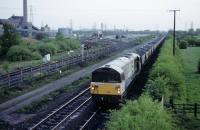
North Stafford Junction: This is 58029 approaching Stenson Junction (behind the camera) on an empty MGR for Toton in 1992. North Stafford Junction is to the rear of the train. Stenson Junction here is alternatively known as Findern Junction or Willington Junction. The photograph is taken from the Buckford Lane Bridge looking south west. On the left is Willington Power Station, now closed and demolished. 58029 later worked in Spain and was cut up there in 2020.
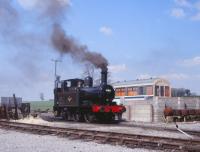
Cranmore: GWR 0-4-2T 1450, being coaled at the East Somerset Railway on 5 May 1996.
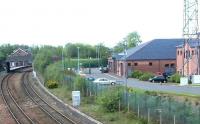
Dumfries Shed: Looking north towards Dumfries station on the other side of St Marys Street bridge in May 2002. The area on this side of the bridge, now the headquarters of Dumfries and Galloway police, was previously occupied by Dumfries locomotive shed. The shed was officially closed in May 1966, with demolition taking place in the early 1980s. The only remnant of the old shed is the base of the west wall running alongside the up line. For the same view in 1971 see image [[6308]].
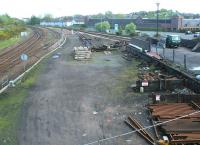
Dumfries Goods: Remains at Dumfries South in May 2002. Most of the sidings have gone with the central area in use as a PW point, although the coal depot seems to have survived. Off to the right the main goods shed has been demolished and most of the ex-railway land is now occupied by retail and car parking, including the inevitable supermarket.

Dumfries: A Carlisle-Glasgow DMU entering Dumfries in May 2002.

Dumfries: The filled-in bays at the north end of Dumfries station in May 2002 with a Carlisle - Glasgow Central service about to restart from through platform 1.
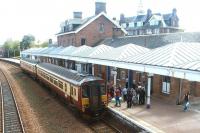
Dumfries: Comings and goings at Dumfries on a fine spring afternoon in 2002 as a train for Glasgow Central (ex-Carlisle) calls at platform 1. Opposite the G&SWR station building stands the companys notable Station Hotel, part of which is visible above the roof line. (For a full view of the hotel see image [[39481]].)
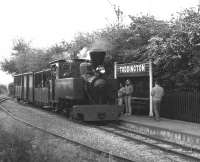
Toddington Halt: Hunslet 0-4-2T Chaka on the 2ft North Gloucestershire Railway line associated with the Gloucestershire, Warwickshire Railway, photographed at Toddington Halt on 5 May 2002.
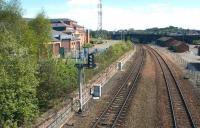
Dumfries Shed: The view south from St Marys Street bridge, Dumfries, in May 2002, with the station behind the camera. For more than 90 years the area on the left was occupied by Dumfries shed. Closed by BR in 1966 the site was not finally cleared until 1982 (see [[3408]]) following which the land stood vacant for several more years until eventually becoming part of the new Dumfries & Galloway Police HQ. The low boundary wall is all that remains of the main shed building.
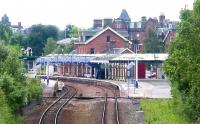
Dumfries: A 2002 view south over Dumfries following the rationalisation carried out there during the 1990s. This included the removal of the centre road through the station, replacement of the old covered footbridge, removal of the disused lines serving the Stranraer route and infilling of the redundant bay platforms. For the layout seen from the same position in 1971 see image [[3438]].
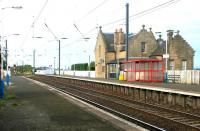
Kirknewton: Colourful Kirknewton. Platform view west towards the level crossing in May 2003.

Heriot: Looking south over Heriot level crossing and the surviving platform on a wet morning in May 2004, with the old gates currently on the verge of collapse. See image [[3647]]
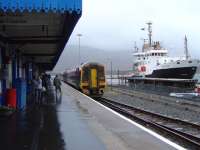
Kyle of Lochalsh: The 17:21 Kyle to Inverness awaiting departure.
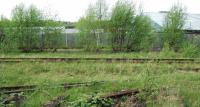
Newcastle [Shot Tower]: A view looking north taken in 2005 in the approximate locale of the Newcastle and Carlisle Railway's original terminus in Newcastle. Forth Junction was off to the left. The line in the background runs up to Newcastle Central and that in the foreground to the remains of Forth Bank Goods, a few engineer's sidings.

Aberdour: The old stone signal box on the up platform at Aberdour in May 2005.
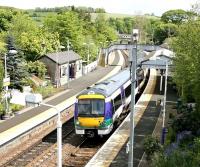
Aberdour: ScotRail 170459 about to restart a Fife Circle service en route to Edinburgh from Aberdour station on a sunny 5 May 2005. The unit is in a 'transitional' livery between National Express and First Group colours.

Aberdour: A Fife circle train arriving at Aberdour in May 2005 on its way back to Edinburgh.

Aberdour: The road approach to Aberdour Station in May 2005. The building, which dates from 1890, is category B listed.

Aberdour: Platform view at Aberdour station looking south in May 2005 with a train leaving for Waverley.
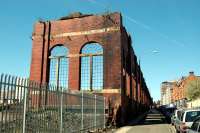
High Street Goods: High Street Goods shed looking west.
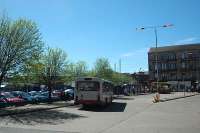
Partick: Partick Interchange. Bus station in the foreground and railway station beyond.

Arbroath: HST power-car 43114 East Riding of Yorkshire heads a GNER Aberdeen - Kings Cross service passing through Arbroath on 5 May 2006.
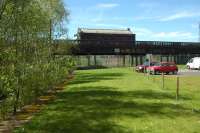
Partick Central: Partick Central looking west. This portion of the platform has been partly removed and partly incorporated into the carpark for some flats.

Merkland Street Tunnel: Merkland Tunnel east end. The Stobcross Railway at Partick crosses over the top.
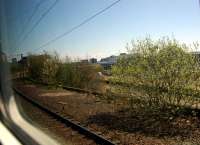
Finnieston East Junction: Finnieston East Junction looking east. Viewed from westbound train on the Queen Street line. This incline gave access to the Queens Dock from Kelvinhaugh Goods and did not carry a passenger service until the Argyle Line opened.
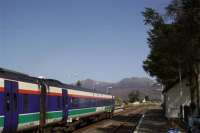
Strathcarron: The 12:36 Kyle to Inverness leaving from platform 1 from Strathcarron after waiting for the Inverness to Kyle sprinter to pass due to the single track lines.

Partick: Partick Interchange under construction at Partick station. Re-building impacts on the ground level buildings at the moment and not the platform level ones.
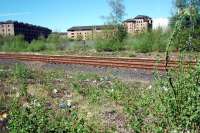
Gallowgate: Looking west over the CGU just east of Gallowgate. The College Goods Yard was straight ahead and the warehousing still standing on the left was part of it.
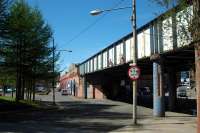
Gallowgate: Looking west at what was Gallowgate. The CGU line is still open here but not used a great deal.
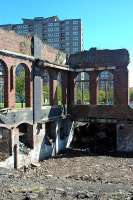
High Street Goods: Two remaining walls of the NBRs huge High Street goods yard goods shed. These last walls may be swept away in a redevelopment of the area. The listed walls in the area are probably of the G&SWR College Goods yard not the NBR High Street one.
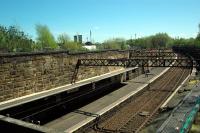
High Street: High Street station looking east. The NBRs High Street goods yard was on the left and the G&SWRs College goods was on the right.
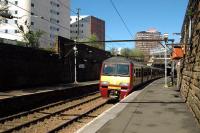
High Street: High Street station looking west. Things have certainly changed since I last photographed this place.
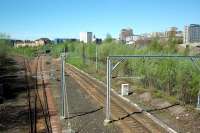
High Street Junction: High Street East Junction (now High Street Junction) looking west. Left to right; CGU line, College goods (closed), GCDR and High Street Goods (closed). High Street goods is being redeveloped.
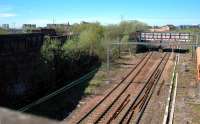
High Street Junction: To the east of High Street East Junction looking west. The line to the Barracks mineral yard was to the left, then the High Street signalbox and then the line still present and finally approach lines for the High Street goods yard.
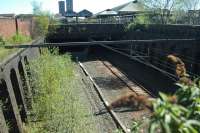
Bellgrove Tunnel: Just west of Bellgrove the line dives under the Glasgow cattle market (closed). View looks east.
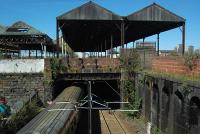
Bellgrove Tunnel: Looking west from Bellgrove the line dives under the Glasgow cattle market (closed). The Bellgrove Independent Tunnel, carrying goods only lines, is behind the wall to the right.
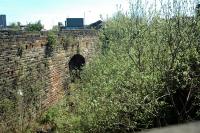
Gallowgate Central: Looking to Bridgeton Central over Gallowgate Central Junction. The line from High Street West Junction was on the left and that from College on the right.
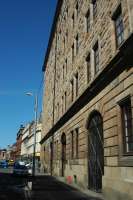
College Goods: The warehousing of the G&SWRs College Goods Yard looking west. The lines were behind this building to the right. Now flats.
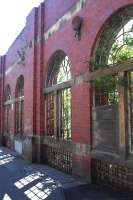
High Street Goods: Part of the surviving exterior wall of the former NB High Street goods depot. Photographed looking south east along Duke Street in May 2006. Note the old fire bell, one of several still attached to the wall.
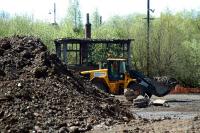
High Street Goods Signal Box: A digger menaces the old control cabin for the High Street Goods Yard. The whole area is being redeveloped and this building cannot have long left to go. Much of this work seems to involve a huge amount of earthmoving.

Redbourn: Much of the 'Nickey Line' from Harpenden to Hemel Hempstead has a good cycle riding surface. Some parts, however, have rather stiff gradients!

Abernethy: Diverted 1913 Perth to Glasgow passes Carey Farm west of Abernethy.

Causewayhead: View from the Wallace Monument with Stirling Castle top centre. The trees by the river mark the site of Wallaces famous victory in 1297. Curving round from the bottom left and running into the distance is the relaid Stirling-Alloa-Kincardine line.

Aberdour: 47804 with The Royal Scotsman east of Aberdour on 5 May 2008.
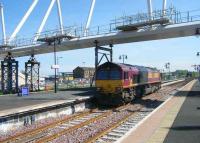
Stirling: The new footbridge over Stirling station taking shape on 5 May 2008. View south with 66134 standing below.
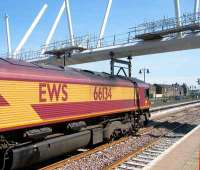
Stirling: 66134 stands at Stirling on 5 May below ongoing work on the new pedestrian bridge that will span the station.
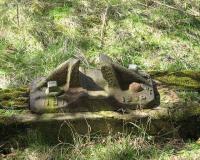
Birky Side Dump: Old NB rail chair amongst the remains at the former St Margarets shed ash dump sidings at Birky Side on 5 May 2008.

Birky Side Dump: Remains of sidings at Birky Side, between Fushiebridge and Tynehead on the Waverley Route, photographed on 5 May 2008. The sidings were used over many years by St Margarets shed as a dumping ground for the ash produced by the depot's large steam allocation. In the 1950s that allocation was over 200 locomotives - a lot of ash! See image [[32374]] Much of the land has now returned to nature and is given over to cattle grazing, but sections of track, sleepers and other reminders of the areas former use can still be found.

Borthwick Bank Signal Box: Maggie Bowies Glen on the Waverley Route, looking southeast from a viewpoint near the top of Borthwick Bank in May 2008. From here the trackbed takes a wide sweep round to the right, heading in the general direction of Tynehead Station.

Stirling: View over Stirling station on 5 May 2009 from the newly opened Shooglybrig.

Dunblane: Most services from Dunblane originate there, having arrived from Edinburgh (twice an hour) or Glasgow (hourly). They all arrive at the outside platform, which would be 3 but no number is displayed, run forward to reverse in the stub, then enter Platform 1 to start the return journey south. Platform 2 serves the few northbound services which stop here, although these will increase when the proposed hourly stopping service from Glasgow to Perth is introduced. The station is seen looking south on a wet 5 May as a 158 waits to return to Edinburgh while a 170 has just arrived from Glasgow.

Glasgow Queen Street High Level: On a wet 5 May 2009, Network Rail's NMT brings a splash of sunshine yellow to Glasgow Queen Street.

Blackpool Central: With the demolition of the old station toilets the only surviving remnants of Blackpool Central are a brick wall on Central Drive, where the old excursion platforms were sited, and this low blue brick retaining wall overlooking Bonney St Market. This wall and path follow the line of the former Platform 1 at Central looking towards the old station throat and Blackpool South. The large building is Blackpool Police Station, part of which is built on former railway land.
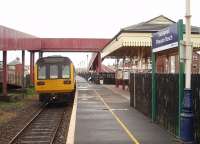
Blackpool Pleasure Beach: Blackpool Pleasure Beach station, opened in 1987 on the site of Burlington Road railmotor halt,looking towards Squires Gate, as 142045 calls on its way to Colne on 5 May 2009 with an all stations service. Burlington Road was opened in 1913 and closed in 1949.

Lanark: 318 259 at the buffers at Lanark on 5 May 2009. It will return to Dalmuir via the direct route.
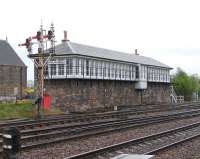
Stirling Middle Junction: Still a fine sight, despite a dwindling number of working leavers. Stirling Middle Junction signal box, photographed looking south on 5 May 2009.
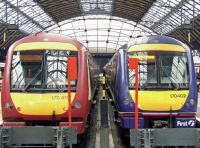
Glasgow Queen Street High Level: 170470 and 170402 at the buffer stops at Glasgow Queen Street's platforms 4 & 5 on 5th May 2009
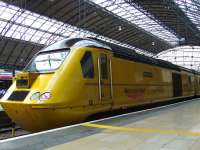
Glasgow Queen Street High Level: Network Rail HST Test train power car 43062 at Glasgow Queen Street on 5th May 2009
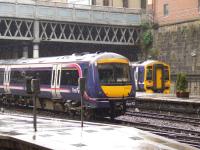
Glasgow Queen Street High Level: 170416 and 158709 at a wet Glasgow Queen Street on 5th May 2009

Glasgow Queen Street High Level: A panoramic view of Glasgow Queen Street, taken from the end of Platform 7
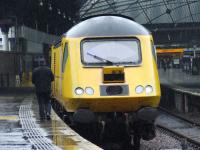
Glasgow Queen Street High Level: Network Rail HST Test train power car 43014 at Glasgow Queen Street on 5th May 2009

Blackpool Pleasure Beach: One of the more distinctive station backdrops! With The Big One standing 250 feet high in the background, Northern Pacer 142045 calls at Blackpool Pleasure Beach on a service from Colne on 5th May 2009. Even on a wet day like this, with the Pleasure Beach closed, this station is busier than the terminus at Blackpool South.

Glasgow Central: Coming soon to a station near you... The mock up of the new Class 380 trains ordered for ScotRail under wraps and being readied at Platform 11 for display from the 7th-20th May to show the public what to expect. Once the display has finished the mock up will be gifted to the Museum Of Transport.
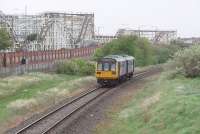
Blackpool Pleasure Beach: What better backdrop for a bouncing Nodding Donkey than Blackpool's Big Dipper and Grand National roller coasters. Pacer 142045 sets off on the last short leg to the end of the branch on 5th May 2009. There are 25 stations between Colne and Blackpool South and journeys take around one hour fifty minutes meaning four units can maintain the weekday hourly services.

Lanark: Lanark station on 5 May 2009, with unit 318 257 awaiting custom for its serpentine journey to Milngavie via Holytown and the Hamilton Circle.

Blackpool Central: Blackpool Central closed in 1964, with the line being cut back to Blackpool South, and the site was quickly cleared. An amusement arcade was built on part of the station and the areas between platforms were filled in to create a huge car park but the toilet block survived, for forty five years until its recent demolition. In this view towards the old buffer stops the remains of the toilets are being cleared away in the shadow of a fairly distinctive looking local landmark.

Blackpool Central: For forty five years after Blackpool Central closed in 1964 the excursion platforms' toilet block continued in use alongside the car park built over the old platforms. It too was demolished however in 2009 and the last remnant is seen here being cleared prior to redevelopment.

Blackpool South: A very wet Blackpool South station sees Northern Pacer 142005, standing by the buffers, ready to leave on the 0844 service to Colne. This is the old Down Lytham platform. All the former railway land to the left of the fence is now used for car parks and roads as is the area behind the photographer continuing all the way to the former Blackpool Central station.
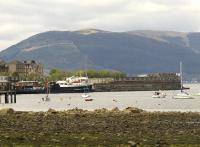
Gourock: A view of Gourock on 5th May 2010, showing the CalMaC ferry DSMV Jupiter at the pier and a ScotRail Class 334 unit standing inside a tired and very shabby looking station. Thankfully this is being put right by Network Rail who are rebuilding the station. See image [[39241]]
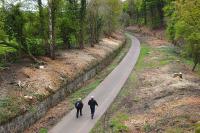
Sheriffhall [2nd]: Trackbed of the Waverley route looking south from the A6106 bridge along the footpath towards Eskbank in May 2012 with tree clearance operations completed. See image [[50790]]
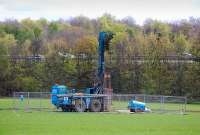
Sheriffhall City Bypass Overbridge: Site investigation to the north of the Edinburgh City Bypass in May 2012 near the point where the Borders railway will burrow under. The Edinburgh & Dalkeith Railway's Sheriffhall station stood near this point on the other side of the road.
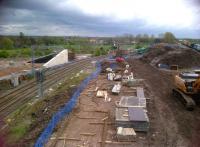
Nuneaton North Chord: Concrete progress - literally - on the Nuneaton North Chord on 5 May 2012. The two recently completed walls on the left will support the embankment leading to the bridge over the chord from the WCML to the Birmingham line. To the right 66715 see image [[38725]] is passing the North Chord turnout from the flyover line from platforms 6 and 7 to Birmingham with a train of containers.
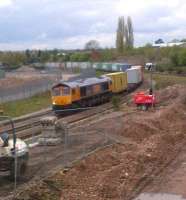
Nuneaton Abbey Junction: GBRf 66715 Valour passes construction works for Nuneaton's North Chord as it heads East with containers on Saturday lunchtime, 5 May 2012.
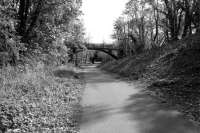
Alloway: Taken from the west of the site of the island platform at Alloway in May 2012 looking to Alloway Junction. The cutting is partially filled on the right by an access ramp for the cycle path. The footbridge is new and the road bridge in the background, built to serve a new housing development, straddles the mid-point of the old station site.
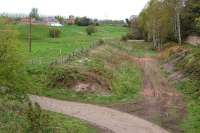
King's Gate Junction: Looking north from the A6106 road bridge by Melville Gate to Old Sheriffhall Farm. The original Waverley Route trackbed disappears into the birch trees at right, while in the middle is marked out the course of the new Borders Railway. The original Edinburgh and Dalkeith was off to the left.
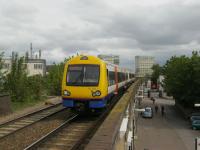
Leytonstone High Road: 172 005 with a London Overground GOBLIN service to Gospel Oak approaching Leytonstone High Road, known as simply Leytonstone until 1949, on 5th May 2012. The train is on the ex-Tottenham & Forest Gate Railway viaduct, extending from Woodgrange Park to Walthamstow Queens Road. This scene has changed with the installation of masts and overhead wires although passengers are still waiting for the full service of new electric trains, promised over a year ago. As of now, the service has been cut to half-hourly with class 378 e.m.u.s brought in as temporary replacements.
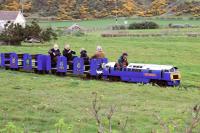
Ballantrae: The miniature railway from Ayr seafront is reborn at Craigiemains Garden Centre. May 2013. See image [[30720]]
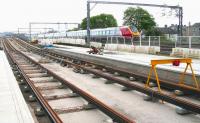
Balgreen [Tram]: Construction work underway on Balgreen tram stop in May 2013. View is east towards the city centre with a Voyager crossing the rail bridge over Balgreen Road. In the left background is the significant 'hump' required by the new tramway bridge to clear the same road. For a view of the adjacent bridges from road level see image [[40474]].
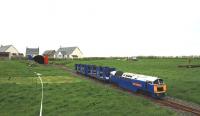
Ballantrae: Ayr Princess and the entire coaching stock at Ballantrae on 5 May 2013 see image [[42972]]. In the background is the storage shed accessed by the solitary set of points.
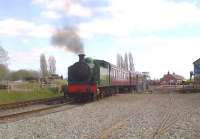
Brownhills West: The Central Electricity Authority (Midlands) 0-6-0 number 4 makes a smokey departure (the 14.45) from Brownhills West, the main station on the Chasewater Railway, on Sunday 5th May. (They run steam on Sundays and diesel on Saturdays). The signal box just visible on the right came from Brereton, near Rugeley.
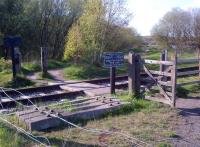
Chasewater Heaths: Appearances can be deceptive. This location on the Chasewater Railway in Staffordshire seems to be a beautifully preserved pedestrian crossing; but two railways (colliery lines) once crossed on the level here. The trespass notices carry the name Chasewater Light Railway.
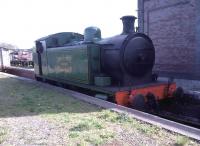
Brownhills West: A closer look at that rather large 0-6-0 see image [[43015]] as it runs round its train at the headquarters of the Chasewater Railway on 5 May. This engine was built by Robert Stephenson & Co. in 1951 - quite late for steam.
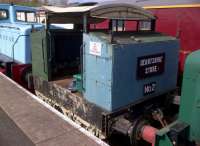
Brownhills West: 'Derbyshire Stone No.2', on display at the Chaswater Railway, is definitely smaller than the average shunting engine; and definitely not luxurious. If Monty Python's Three Yorkshiremen were train drivers, I'm sure they would include this in their improbable progressive decline in working conditions!
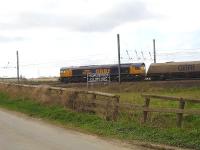
Beningbrough: GBRf 66706 runs south past the Edinburgh 200 miles sign at Shipton, north of York, on Sunday 5 May 2013. The loaded coal wagons are destined for Drax power station.
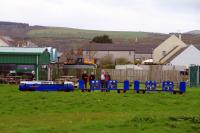
Ballantrae: A shot from the recent past. The miniature train at Craigiemains Garden Centre on 5th May 2013. Sadly, the Centre and the railway are now closed, apparently for good. A visit on 24th September 2020 showed all accesses padlocked and no possibility of photography except of the buildings. Another one bites the dust - unfortunately.
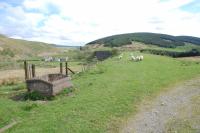
Shankend Viaduct: Shankend Viaduct looking south towards [[Shankend]] station (in the distance beyond the viaduct) in 2014. No walking allowed over the viaduct.
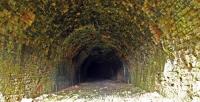
Whitrope Tunnel: This was the view looking south from the north portal of Whitrope Tunnel in 2014. The tunnel has subsequently been fenced off.
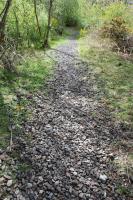
Slitrig Viaduct: View south to Slitrig (or Lynnwood) Viaduct, south of Hawick. Here for a mile or so the ballast remains intact. The ballast provides a useful source of drainage stones for local use I'm told!
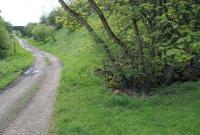
Slitrig Viaduct: Flex cutting and bridge, two miles south of Hawick, 43 years after track lifting see image [[27623]]
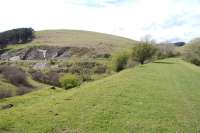
Shankend: Remains of an old ballast quarry by the White Hill, north of Shankend, on the west side of the Waverley route. When the line was being built it was served by a triangular junction until the embankment became too high. Latterly it was accessed via a siding from the north. It seems to have closed around the time of the line's opening in 1862. View in 2014, with the Waverley trackbed running north towards Stobs.
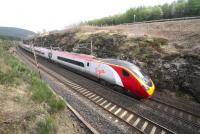
Beattock Summit: A northbound Pendolino approaching Beattock Summit on 5 May 2014.
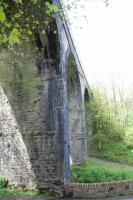
Barnes Viaduct: Barnes Viaduct, also known as Stobs or Barns, showing the east side in a view looking north. The former Stobs station is behind the camera.
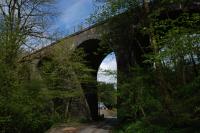
Barnes Viaduct: The Barnes (or Stobs) Viaduct looking north showing the west side. This disused viaduct is directly north of the former [[Stobs]] station.
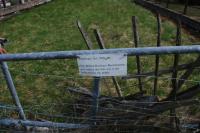
Shankend Viaduct: The British Railways Board 'this way is not dedicated to the public' notice on Shankend Viaduct, seen at the north end.
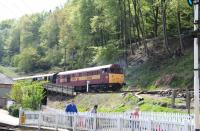
Norchard High Level: Scene at Norchard High Level on the Dean Forest Railway on a pleasant 5 May 2014. 31466 is preparing to leave the station with a train for Parkend.
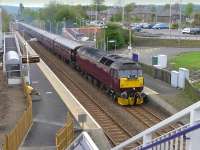
Rosyth: 47854 Diamond Jubilee with the Edinburgh - Boat of Garten Royal Scotsman passing Rosyth on 5 May. The new access ramps are now in service at the station and the temporary footbridge has been removed. See image [[46017]]
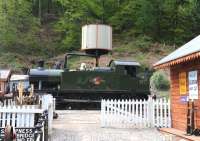
Norchard: Scene at Norchard in the Forest of Dean on 5 May 2014, with GWR 2-6-2T 5541 taking on water.
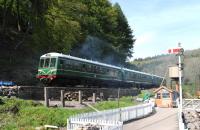
Norchard High Level: A DMU departing Norchard High Level for Parkend on 5 May 2014.
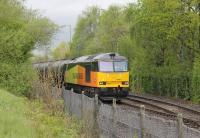
Strand Road Exchange Sidings: A shiny Colas Rail Class 60 waits for departure time with the bitumen empties at Strand Road sidings on 5th May 2015. The train normally runs MWF only but due to the May Bank Holiday 60021 had brought the loaded tanks from Lincolnshire on the Tuesday.
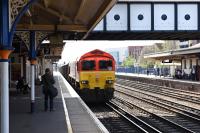
Eastleigh: DBS 59205 brings a container train through Eastleigh on 5 May.
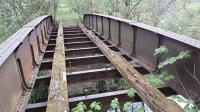
Eden Viaduct: This view, taken on the Eden Viaduct, is the view southwards towards Cults Hill.
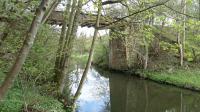
Eden Viaduct: This view of the Eden Viaduct is downstream, past the bridge.
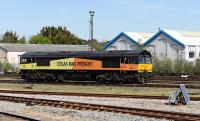
Eastleigh: Colas 66847 shut down in the sidings at Eastleigh on 5 May 2016.

Langloan Junction: Passengers on Aberdeen and Inverness trains diverted to Glasgow Central get a momentary view of this spectacular ruin between Coatbridge Central and Langloan Jn.
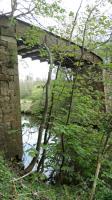
Eden Viaduct: Downstream of the Eden Viaduct looking up to the girder.
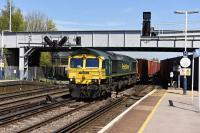
Eastleigh: Freightliner 66594 with a train of containers heading south on the centre road through Eastleigh station on 6 May 2016, bound for Southampton docks.
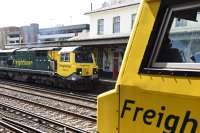
Eastleigh: Freightliner 70013 & 70014 stopped for crew changes No doubt there is an operational reason why the crew changes take place mid platform and not at the platform stop signal, some of these freights seem to be a mile long and tailing back down the railway.
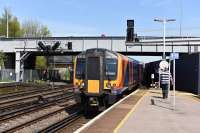
Eastleigh: 450-039 slowly scraping past a stopped Freightliner. These 12 car trains are pretty impressive as they negotiate the points/curves.
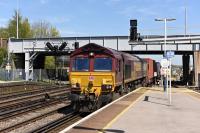
Eastleigh: DB 66192 s/bound for the docks at Eastleigh.
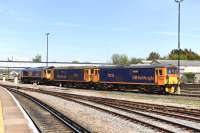
Eastleigh: GBRf trio 66757, 73212 and 73213 stabled in the sidings alongside Eastleigh station on 5 May 2016.
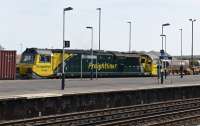
Eastleigh: Freightliner 70006 gets underway southbound at Eastleigh on 5 May following a crew change.
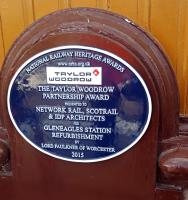
Gleneagles: Plaque unveiled today at Gleneagles by Andy Savage RHT and Fred Garner of Taylor Woodrow.
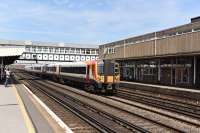
Eastleigh: Southwest Trains 444030 racing through Eastleigh station southbound on 5 May 2016.
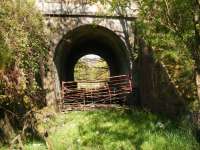
Mossend Bridge: A network of lines spreading west from Glengarnock connected several ironstone pits with the ironworks at Glengarnock but all were worked out by the early twentieth century and so iron ore had to be imported. One tangible reminder of these lines is this substantial bridge which permitted one of these lines to pass under what is now the B780 between Kilbirnie and Dalry. It will be well over 100 years since it last saw a train.
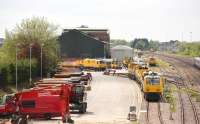
Highworth Junction: View west showing a selection of the various plant and equipment located at Highworth Junction GW electrification depot to the east of Swindon on 5 May 2017. The Great Western main line runs past on the right.
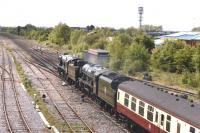
Highworth Junction: 34052 (aka 34046) & 46100 westbound light engines to Bristol as part of the Great Britain Experience. The line disappearing to the right is the stub of the former Swindon and Highworth Railway.
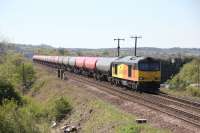
Greenhill Lower Junction: Vegetation clearance for the overheads has opened up locations not available for years, but not for long. With the encroaching masts in the distance 60076, with the Dalston - Grangemouth empties, crosses Broomhill Road overbridge east of Greenhill on 5th May 2017.
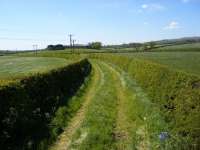
Glengarnock Iron Works: From Glengarnock Iron Works a line headed west to serve ironstone pits and also south to serve coal mines in the Dalry area. After passing along what is now Balgray Road and on into Loadingbank the line turned south. At this point the track bed is now a well kept farm track but the sweeping curve gives a good clue to its original use.
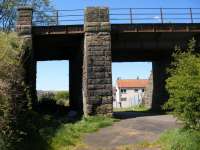
Glengarnock Iron Works: From Glengarnock Ironworks a line headed west to serve ironstone pits and also south to serve coal mines in the Dalry area. From the ironworks the line descended to and then crossed the B777. After crossing the river Garnock, where the abutments still serve to support a footbridge, it headed due west along what is now Balgray Road and on into Loadingbank. It pre-dated construction of the G&SWR Lochwinnoch loop line so when the G&SWR line was built it crossed the line by this bridge which as can be seen accommodated the mineral railway on the left side and the road on the right. View looks west towards Loadingbank.
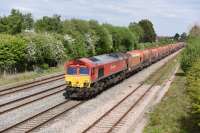
Highworth Junction: 66097 westbound approaching Swindon on 6th May 2017 with empty stone wagons heading for Whatley Quarry via Melksham & Westbury.
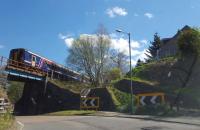
Crianlarich Junction: Ex Oban train approaching Crianlarich station on the short spur which links the West Highland to the Callander and Oban. Ahead the narrow bridge where trucks have to take the centre of the road to safely pass under.
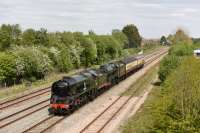
Highworth Junction: Taken on the eastern outskirts of Swindon, 34052 (aka 34046) & 46100 pass westbound light engine to Bristol as part of the Great Britain Experience. Back through Swindon at 1900 hours on Sunday.
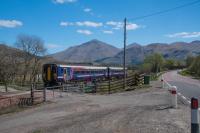
Inverhaggernie No 1 Level Crossing: An Oban to Glasgow service heads east over Inverhaggernie Level Crossing No 1, west of Crianlarich. The rear of the train is by the camera.
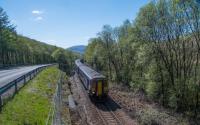
Crianlarich: Northbound Sprinter in Glen Falloch about to pass under the A82 south of Crianlarich.
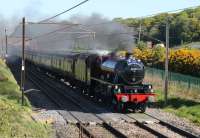
Woodacre Crossing: Jubilee 45699 hauled the Grange-over-Sands to Bristol leg of the Great Britain X railtour on 5th May 2017, which was Day 7 of 9. After touring Scotland GB X was scheduled to visit Penzance before finishing at London Paddington. Galatea is seen passing Woodacre at the start of the Day 7 journey.
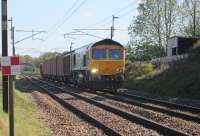
Woodacre Crossing: A MOD freight ran from Bicester to Carlisle on 5th May 2017. GBRf 66709 Sorrento was the loco in charge of four bogie container wagons with barrier vans front and rear. The unusual working is seen approaching Woodacre near Garstang.
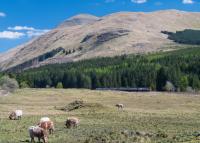
Crianlarich: Southbound Sprinter passing the 'distant' south of Crianlarich, with Ben More dominating.

Blandford Forum: A historic picture for two industries. Unusually, there are cars from two defunct makes here - the immaculate SAAB 9-5 in the foreground and the tatty Rover 25 in the background. Each car is parked next to a pair of rails which allegedly led from the station to the goods yard, though they don't quite seem to be in the right places. View looks North.
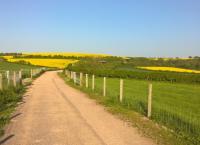
Blandford Forum: North of Blandford Forum, but looking South, this sweeping curve follows almost exactly the trackbed of the S&D (the original might have been slightly to the left of this view). Although I was expecting a tunnel due to the lie of the land, the solum runs along a shelf on the hillside in the distance. The barn on the hillside is of interest to rail fans, as the ground floor wall at the side opposite to the railway is built of upright used wooden sleepers.
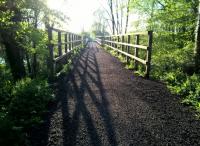
Sturminster Newton: A high contrast view looking North over the replacement bridge over the River Stour, South of Sturminster Newton see image [[49255]].
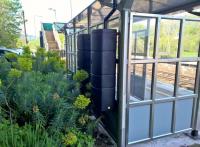
Freshford: If I told you there were two water tanks at Freshford, you probably wouldn't believe me. But here they are on the back wall of the passenger shelter on platform 1, harvesting rainwater to water the gardens. Probably not big enough (or clean enough water) to help out with passing steam engines. [Ref query 18 July 2018]
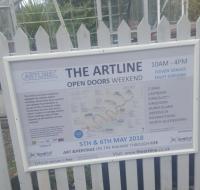
Aberdour: A poster for the 'Artline' Open Doors weekend at Aberdour. The 'Artline' is named for the station buildings restored and now in use as artists' studios or heritages centres in Fife. Stations include Cupar, Ladybank, Kirkcaldy, Kinghorn, Burntisland, Aberdour, Inverkeithing and North Queensferry.
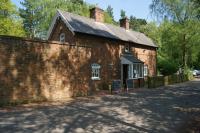
Whitegate: The station building and house at Whitegate on the former CLC branch line to Winsford & Over, seen from the approach road with the trackbed on the other side of the building. Although the station closed to passengers in 1931 it remained open for goods traffic until 1963. Fortunately the building survived and is now a visitor centre and cafe.
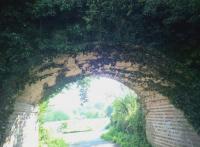
Stourpaine and Durweston Halt: Many of the bridges on the Southern part of the S&D survive in remarkably good condition. This bridge near Stourpaine seems to have attracted some very clingy ivy to its underside.
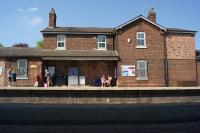
Greenbank: Passengers wait for the next Manchester bound train at Greenbank station on the CLC line from Chester to Altrincham.
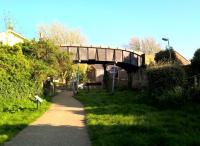
Blandford Forum: Looking South towards Bournemouth, the station footbridge has an air of permanence; not least because first floor flats on the right are accessed by ramps off the bridge approach. There is no sign, however, of the former subway; while the buffer stop under the bridge is not in its original position.
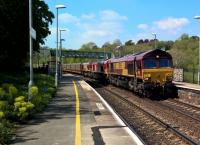
Freshford: Every Saturday, there are one or two coupled processions of three or four Class 66s running from South Wales (Newport ADJ or Margam) to Eastleigh for servicing (e.g. refuelling). In this shot on 5th May 2018 a colourful sandwich of EWS 66221, DB 66131 and EWS 66013 haul empty car carriers from Alexndra Dock Junction to the South Coast. My first freight shot at Freshford, after visiting for some six years!
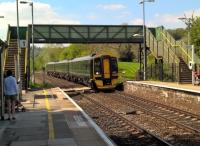
Freshford: It's easy to get 'picture postcard' views at this delightful station. The train is the 14.44 to Portsmouth Harbour, originating at Cardiff Central, and comprising 158798 in immaculate Great Western green.
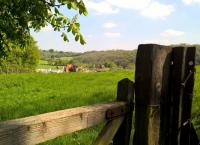
Freshford: Is there no part of our rail network free from platform lengthening? Evidently not, as Freshford is caught in the 'more concrete' mania. A service from Waterloo to Bristol Temple Meads inspects the works on 5th May 2018.
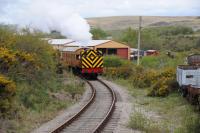
Big Pit Mining Museum: 'JESSIE,' a Hunslet 0-6-0ST No. 1837 of 1937, running into the Big Pit Mining Museum station on the Pontypool & Blaenavon Railway on 5th May 2019.
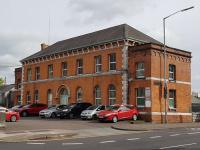
Cork Capwell: Cork & Macroom Direct Railway's Capwell Station in Cork. Yet another terminus station in the city for the Irish standard gauge line opened in 1866 between Cork and Macroom. Originally the C&MDR trains used the CB&SCR Albert Quay station but the company opened its own terminus here at Capwell in 1879 and the link with the CB&SCR was severed. A link between the two systems was reinstated in 1918 and trains to Macroom again started using Albert Quay station in 1925. However, passenger services ceased in 1935 and the system was closed in 1953. The fine terminus building at Capwell survives as the offices for the principal bus depot in Cork, which lies on the station site. 5th May 2019
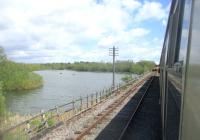
Butterley: View from Midland Railway Centre train from Hammersmith to Riddings behind 47 401 on the causeway across Butterley reservoir, on 4th May 2019.
See query 2078
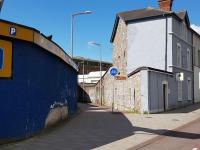
Cork Albert Quay: The cycle route curving left in this picture is part of the former Cork City Railways route from Kent station to Albert Quay, which lasted from 1912 to 1980 and is seen here on 5th May 2019.
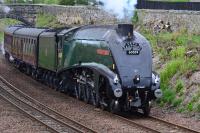
Donibristle Platform: 60009 Union of South Africa climbs Donibristle bank with the SRPS excursion from Linlithgow to Aberdeen on 5th May 2019.
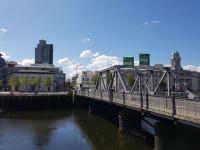
Cork Albert Quay: The Cork City Railways line, linking the Great Southern & Western Railway system and the Cork, Bandon and South Coast Railway systems between Glanmire Road (now Kent station) and Albert Quay station (pictured in the distance) ran largely along roads and shared bridges across the two branches of the River Lee with roads. The line ran into the Albert Quay station through gates just to the right of the surviving terminal building. Albert Quay closed to passengers at the end of March 1961 but the station site survived as a freight terminal until 1980. 5th May 2019.
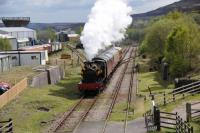
Furnace Sidings: Hunslet 0-6-0ST 'JESSIE' arriving back in Furnace sidings from Blaenavon High on 5th May 2019.

Furnace Sidings: Hunslet 0-6-0ST 'Jessie' is buffered up to the rear of the Pontypool and Blaenavon coaches in preparation for propelling the train up to the Whistle Inn Terminus. 5th May 2019.
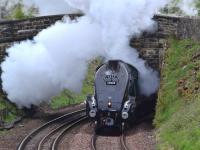
Donibristle Platform: 60009 Union of South Africa climbs Donibristle bank with the SRPS excursion from Linlithgow to Aberdeen on 5 May 2019.
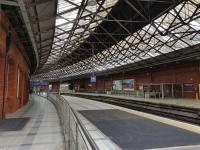
Cork Kent: A quiet period inside Kent station in Cork, opened in 1893 as Glanmire Road and renamed in 1966 after Thomas Kent, who was executed by the British in Cork after the Easter Uprising in 1916. These are the mainline platforms for trains to Mallow and Dublin. There is no through working to Cobh and Midleton (as far as the Youghal line runs these days) and the platforms for those services are at the east end of the station. However, through running is needed to allow trains to reach the loco shed and carriage sidings at the east end of the station. There is a line which also by-passes the outer wall of the station which is also used for empty stock movements. It was formerly also used for freight but there are no scheduled freight services currently operating to Cork. Kent is also the only one of Cork's six stations still operational and the only one which actually linked up with other systems, which was a considerable problem for integrated rail transport in the Cork area! 5th May 2019.
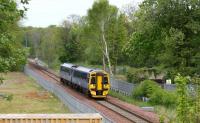
Glenesk: The 0911 ScotRail Edinburgh - Tweedbank has just crossed Glenesk Viaduct southbound on 5 May 2019. The site of Glenesk Junction is directly behind the train. On the left is the old yard that once served the former Glenesk Colliery, (most recently used for the storage of various building materials). The train is just over half a mile from its next stop at Eskbank.
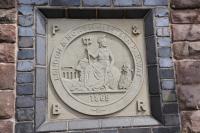
Furnace Sidings: A recently installed plaque celebrating the original ownership of what is now the Pontypool and Blaenavon Heritage Railway, followed by the LMSR and then BR. 5th May 2019.
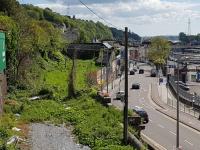
Cork Summerhill: Summerhill Station in Cork, looking east towards Tivoli and Youghal on 5th May 2019. This station was opened in 1861 for standard Irish gauge trains from Youghal and Cove. Taken over by the Great Southern & Western Railway in 1866, the station was abandoned in 1893 when the new Glanmire Road (now Kent) station was opened linking the Great South Western main line to the Youghal line through very sharply curved platforms. Remarkably, the trackbed remains at Summerhill despite closure in 1893 and the picture was taken from a footbridge which still spans the former trackbed.
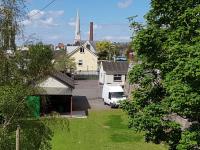
Cork Summerhill: Summerhill Station in Cork, looking west to the bufferstops and the likely site of the Cork and Youghal Railway station buildings on 5th May 2019.
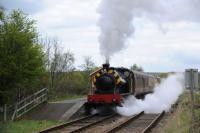
Blaenavon High Level: 'JESSIE,' a Hunslet 0-6-0ST No 1837 of 1937, departing Blaenavon High Station on 5th May 2019. The Pontypool and Blaenavon line is mostly on a decent gradient and in consequence the engine sounded good.
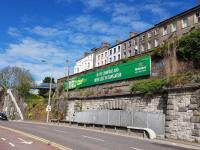
Cork Summerhill: This picture shows the former Cork Summerhill station site, (opened 1861 serving Youghal) above the Great Southern & Western Railway mainline tunnel (opened 1855), on 5th May 2019. Originally the stations, Penrose Quay and Summerhill were at right angles to each other but with the opening of Glanmire Road station in 1893 a sharply curved link was made between the two systems and the earlier stations were closed. A footbridge over the tracks into Summerhill station remains in place.
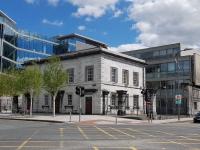
Cork Albert Quay: Albert Quay Station, Cork, in May 2019. The former main building at Albert Quay (opened in 1861) survives as offices although the station site has been completely redeveloped and the trackbed south out of the city is now a main road. This Irish standard gauge network ultimately reached Kinsale (1863), Bantry (1881), Baltimore (1893) and Clonakilty (1886). In 1925 it became part of the GSE and survived into CIE days, with the whole system closing at the end of March 1961 (the Kinsale branch had closed in 1931) - in the face of huge opposition. The gate on the right of the terminal building was where the Cork City Railways link to Glanmire Road accessed Albert Quay. This was only used for freight and empty stock movements and lasted until 1980 as Albert Quay continued to be used as a freight terminal until then.
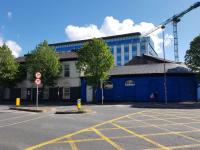
Cork Albert Street: Cork, Blackrock and Passage Railway station at Albert Street, Cork. At right angles to nearby Albert Quay station (and not to be confused with it!) was the terminus of the 3ft CB&PR opened in 1850. The line was originally Irish standard gauge to Passage but when the extension to Crosshaven was opened in 1896, it was 3ft gauge to reduce costs and the whole line was regauged between 1902 and 1904. An important commuter line it was absorbed into GSR in 1925 but closed in 1932. The line from just west of the City to Passage survives as a cycle way as does the section from just west of Carrigaline to Crosshaven. Remarkably the whole Albert Street Station buildings survive with the complete overall train shed still in place (top of it just visible in centre right of picture) although not accessible as it is part of a builders' merchants storage facility. The area around here is being rapidly redeveloped. 5th May 2019
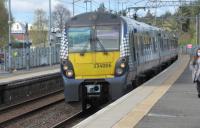
Uphall: A Helensburgh to Edinburgh service pulls into Uphall on 5 May 2021. Uphall itself is a bit away and the early station (called Houston) was rather isolated. The shale industry later brought in people and the village of Uphall Station appeared, along with Pumpherston which was previously just a farm. The station now does for Broxburn too.
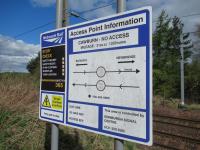
Cawburn Junction: Although in an area full of mineral lines there was no junction here until it became the location of the points where the 1986-2010 version of the Bathgate line became double track to Newbridge. After 24 years of fame at least it is still a name on a (slightly pointless?) sign. It is in a location fancifully - or maybe just mistakenly - called Roman Camp.
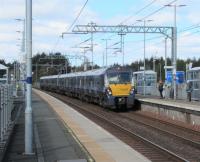
Uphall: An Edinburgh service calls at Uphall on 5 May 2021. Uphall village has expanded over the decades (to merge with Broxburn) but has not advanced much towards its station so is a fair bit away, under the M8 and through the trees. There has been plenty of growth on this side of the line though, including the still expanding village of Uphall Station.
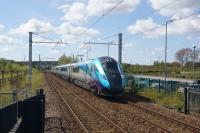
Buckshaw Parkway: On the second day of WCML testing, 802201 approaches Buckshaw Parkway with the Carlisle to Bolton leg of the trip on 5th May 2021. At least the day was dry and sunny unlike the soaking I got the previous day photographing the set at Euxton Junction!
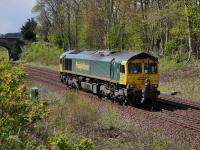
Dalgety Bay: Freightliner 66955 has just passed through Dalgety Bay, with a RILA scanner trip, returning to Millerhill from Aberdeen on 5 May 2021.
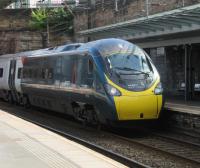
Haymarket: A Pendolino for London Euston bursts out of Haymarket Tunnel and into the station on 5 May 2021. The train manager (or whatever they are called now) will have just finished the spiel which they started on leaving Waverley and will shortly start saying it all over again.

Finse: Finse station, at 1222m (4010') ASL is the highest on the Norwegian rail network. That height and the northern latitude means there was still a lot of snow around when the Bergen Express called in May 2022. There is no public road access to the area but the village developed as a resort once the railway arrived. The station, in typical Norwegian ox blood red paint, also houses a museum dedicated to the navvys who built the railway through such inhospitable terrain.
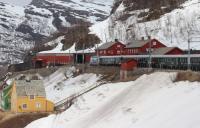
Myrdal: Looking back from an Oslo to Bergen express leaving Myrdal, almost 900m above sea level, on 5th May 2022. In the station is the connecting train for Flam, ten coaches with a powerful modern electric loco at each end. The difference in gradient between the snow shelter of the main line and that of the Flam branch is very noticeable.
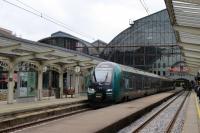
Bergen: While these 75xxx EMUs seem to be used all over southern Norway, a number are sub-branded Vossebanen and dedicated to the Bergen to Myrdal section of the line. Following a general rebrand of the Norwegian State Railways to Vygruppen, shortened to Vy, they have been reliveried from NSB red and silver to a dark green The splendid Bergen station is a complete contrast to the concreted terminus at Stavanger.
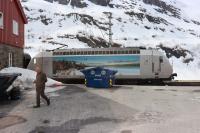
Myrdal: NSB EL18 loco No.2250 in Myrdal station on Flam line duties, seen from a Bergen bound express calling on 5th May 2022. These powerful locos top and tail excursions on the very steeply graded but adhesion worked line.
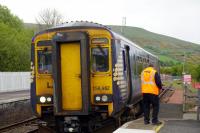
Girvan: The 11.59 arrival from Stranraer surrendering the token for the section Barrhill to Girvan on 5th May 2022. At the time this seemed to be a routine occrence, however it is now history as this train has been deleted from the new timetable. Indeed the service on this line has been decimated.
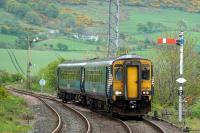
Girvan: The 11.06 from Stranraer comes down off Glendoune bank to hand over the token and form the 11.59 to Kilmarnock on 5th May 2022. As far as it is possible to make sense of the timetables shambles this train has been deleted as from 16th May. It used to cross the 12.01 to Stranraer but that was long gone due to Covid - but in the emergency timetable it has been reinstated. Confused?
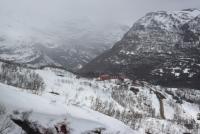
Myrdal: View from the Bergen Express, approaching the snow sheds at Myrdal, looking down into the Flam Valley in May 2022. The hotel and first station at Valtnahasen can be seen, as can the Flam Railway itself curving round the valley side.
Events
Events from the chronology which occured on this day. This generally lists events before 1995, the creation of the website.
News
These are old news items which which occured on this day. This generally lists events after 1995, the creation of the website.
| Year | Companies | Description |
|---|---|---|
| 2006 | Parent^s cash crisis hits GNER [Scotsman] | EAST Coast train operator GNER is far more reliant on its troubled parent group Sea Containers than was previously believed, according to a report the New York-listed company filed with US financial regulators. |
| 2006 | First ScotRail rolls out train ads through Viacom [MediaWeek] | Viacom Outdoor has introduced advertising to the busiest commuter trains in Scotland in a deal with First ScotRail. The company has installed 700 A3 wall mounted panels to 50 trains that link Edinburgh, Glasgow, Aberdeen and Inverness. [See link for rest of article.] |
| 2006 | City struck by storm chaos [Evening Times] | [Extract] RAIL: First ScotRail had to terminate its Glasgow to Kilmarnock services at Barrhead; Edinburgh services were diverted and the Argyll line closed. |
| 2006 | High Street Goods Yard redevelopement | The old site of the NBR^s High Street goods yard is being re-developed. Opinions vary as to whether the remaining walls of the goods shed are listed or not. |
| 2006 | Footbridge delivered to Waverley for Waverley Steps | A new footbridge has been delivered to Edinburgh Waverley for the Waverley Steps. |
| 2008 | Track walk for subway passengers [BBC News Article] | Passengers are forced to walk between stations on the Glasgow subway after a fault on one of the trains. |
| 2009 | Give us back our footbridge [Evening News] | IT WAS built in the late 19th century to replace an ancient road that used to link the city^s Old Town and Leith Walk before the opening of Waverley Station. The footbridge, which linked Jeffrey Street to Calton Road, was ^temporarily^ closed by British Rail in 1950 and has never reopened [From David Panton] |
| 2009 | Lord Adonis criticises railway companies for Rover ticket price rise [The Times] | Now is not the best time to offend the Rail Minister if you are a train company desperately seeking a Government bailout. [From Mark Bartlett] |
| 2010 | Bridge renewal as rail link progresses westward [Network Rail] | Work to reopen the Airdrie-Bathgate Rail Link continues to advance westward this month as Network Rail replaces a bridge deck at Bedlormie Toll, between Caldercruix and Blackridge |
| 2012 | Green Bay locomotive returning to England [Milwaukee Journal Sentinel] | Green Bay - The mighty steam engine named after Dwight Eisenhower is about to get its passport stamped again. Almost half a century ago, the locomotive and coal tender traveled from England via rail and sea to Green Bay, where it has attracted thousands of train fans and World War II history buffs to the National Railroad Museum. Soon it will head back across the pond for the 75th anniversary celebration of the world speed record for steam locomotives. The record wasn^t set by the London and North Eastern Railway A4 locomotive housed in a climate-controlled building in Green Bay. But since there are only six surviving A4 steam engines in the world, the Eisenhower is highly sought after. The dark green locomotive and tender are attached to two rail cars used by Eisenhower as a mobile command headquarters in England during the planning for the D-Day invasion in 1944. [From Richard Buckby] |
| 2015 | When is a late train really late? [BBC News] | There are different ways of measuring how late a train appears to be. Government figures for the last two years show that the worst-performing company, CrossCountry Trains, saw 89% of its trains arrive on time. Its long-distance services are only recorded as late if they arrive more than ten minutes after the scheduled time. But using Department for Transport data - recording trains that arrive more than one minute later than scheduled - only 42% of their trains arrived on time. Tony Miles from Modern Railway Magazine explains when a late train is really late. |
| 2016 | Vauxhall station fire disrupts London rail services [Guardian] | A fire on the tracks at Vauxhall railway station in south London has caused severe disruption to travel. Trains in and out of Vauxhall and Waterloo stations were affected as firefighters tackled the blaze, which broke out shortly after 2.30am. South West Trains (SWT) urged passengers to travel only if absolutely necessary. Passengers were left stranded at stations across the network, with those who did manage to get on a train saying services were dangerously full. The blaze affected electrical cabling and the power to the tracks has been switched off. |
| 2018 | End of line for Sleeper trains that go bump in the night [Scotsman] | Passengers on the Caledonian Sleeper^s brand new trains are promised a ^silky smooth^ ride that will consign the services notorious bumps and jolts to history. |
| 2020 | LNER FutureLabs innovation programme launched [Railway Gazette] | The LNER FutureLabs programme has been launched to provide an opportunity for technology start-ups to test their ideas in the railway environment. |
| 2020 | RFG and Transform call for a National Low-Carbon Freight Network [Transform Scotland] | We have today, alongside Rail Freight Group (RFG), published our joint proposal for a ^National Low-Carbon Freight Network^ in response to the Scottish Government^s consultation on the new National Planning Framework (NPF4). Joe O^Donnell, Rail Freight Group^s Head of Policy, said: ^Granting our proposed National Low-Carbon Freight Network national development status is a real opportunity^. |
| 2020 | Storm damaged Cumbrian Coast line set to reopen in one month [Network Rail] | Repairs will soon be complete on a section of the Cumbrian Coast line left badly damaged by three consecutive storms earlier this year. |
| 2020 | Railway trespassing incidents on Coatbridge lines [Daily Record] | Network Rail have now launched a safety campaign after 70 trespassing events across Scotland in the past seven weeks. |
| 2020 | Train delays in Glasgow reportedly due to a fire [Scotsman] | Scotrail reported that a fire between Yoker and Garscadden in the West side of the city. |
